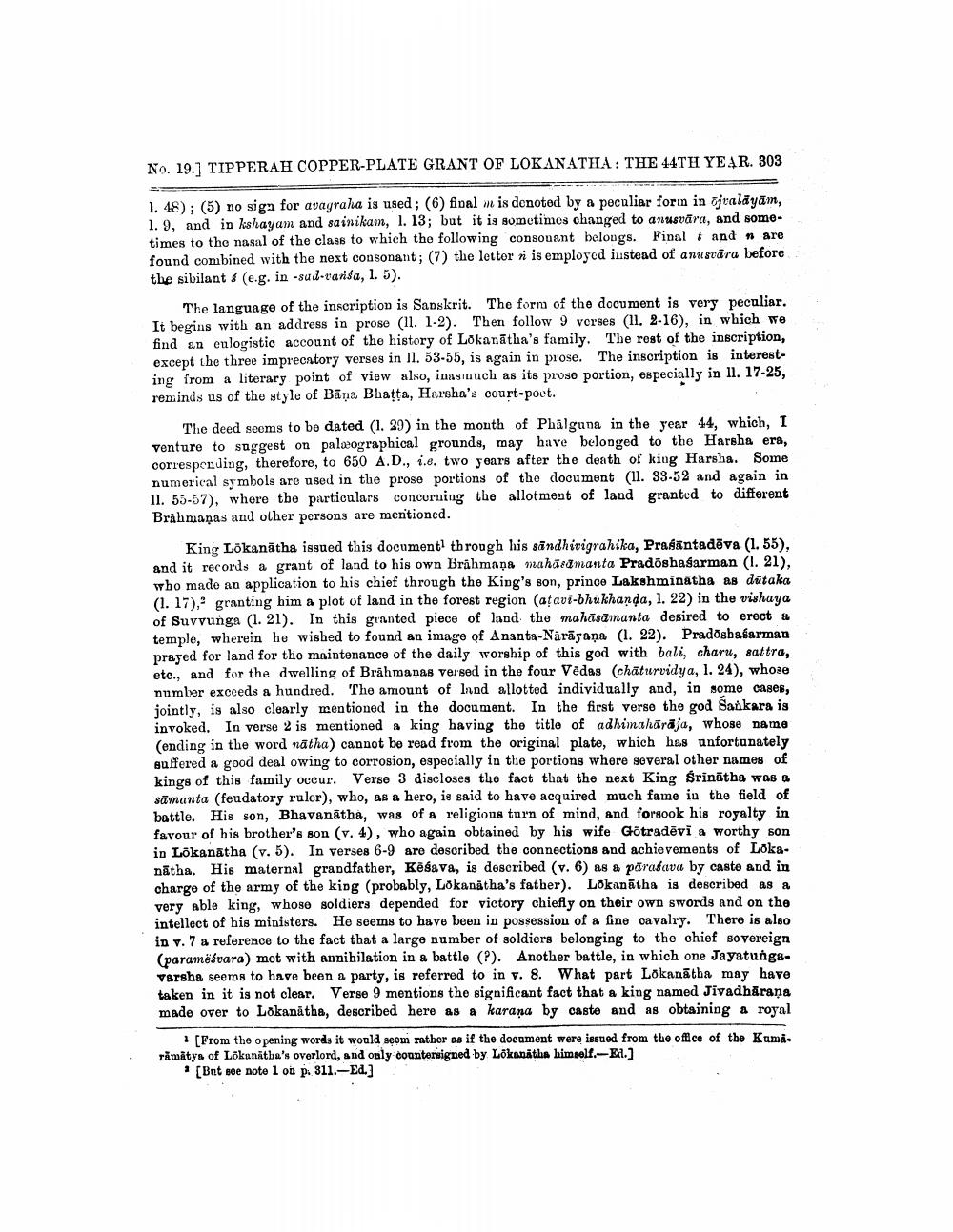________________
No. 19.] TIPPERAH COPPER-PLATE GRANT OF LOKANATHA: THE 44TH YEAR. 303
1. 48); (5) no sign for avagraha is used; (6) final is denoted by a peculiar form in ojvalayam, 1. 9, and in kshayam and sainikam, 1. 13; but it is sometimes changed to anusvära, and sometimes to the nasal of the class to which the following consonant belongs. Final and n are found combined with the next consonant; (7) the letter n is employed instead of anusvara before the sibilant (e.g. in -sud-vansa, 1. 5).
The language of the inscription is Sanskrit. The form of the document is very peculiar. It begins with an address in prose (11. 1-2). Then follow 9 verses (11. 2-16), in which we find an eulogistic account of the history of Lokanatha's family. The rest of the inscription, except the three imprecatory verses in 11. 53-55, is again in prose. The inscription is interesting from a literary point of view also, inasmuch as its prose portion, especially in 11. 17-25, reminds us of the style of Bana Bhaṭṭa, Harsha's court-poet.
The deed seems to be dated (1. 29) in the month of Phalguna in the year 44, which, I venture to suggest on paleographical grounds, may have belonged to the Harsha era, corresponding, therefore, to 650 A.D., i.e. two years after the death of king Harsha. Some numerical symbols are used in the prose portions of the document (11. 33-52 and again in 11. 55-57), where the particulars concerning the allotment of land granted to different Brahmanas and other persons are mentioned.
King Lokanatha issued this document through his sandhivigrahika, Prasantadēva (1.55), and it records a grant of land to his own Brahmana mahaeamanta Pradoshasarman (1. 21), who made an application to his chief through the King's son, prince Lakshminätha as dutaka (1. 17), granting him a plot of land in the forest region (aṭavi-bhukhanda, 1. 22) in the vishaya of Suvvunga (1. 21). In this granted piece of land the mahasamanta desired to erect a temple, wherein he wished to found an image of Ananta-Narayana (1. 22). Pradoshasarman prayed for land for the maintenance of the daily worship of this god with bali, charu, sattra, etc., and for the dwelling of Brahmanas versed in the four Vedas (chaturvidya, 1. 24), whose number exceeds a hundred. The amount of land allotted individually and, in some cases, jointly, is also clearly mentioned in the document. In the first verse the god Sankara is invoked. In verse 2 is mentioned a king having the title of adhimaharaja, whose name (ending in the word natha) cannot be read from the original plate, which has unfortunately suffered a good deal owing to corrosion, especially in the portions where several other names of kings of this family occur. Verse 3 discloses the fact that the next King Srinatha was a samanta (feudatory ruler), who, as a hero, is said to have acquired much fame in the field of battle. His son, Bhavanatha, was of a religious turn of mind, and forsook his royalty in favour of his brother's son (v. 4), who again obtained by his wife Gōtradevi a worthy son in Lokanatha (v. 5). In verses 6-9 are described the connections and achievements of Lokanatha. His maternal grandfather, Kesava, is described (v. 6) as a parasava by caste and in charge of the army of the king (probably, Lokanatha's father). Lokanatha is described as a very able king, whose soldiers depended for victory chiefly on their own swords and on the intellect of his ministers. He seems to have been in possession of a fine cavalry. There is also in v. 7 a reference to the fact that a large number of soldiers belonging to the chief sovereign (parameśvara) met with annihilation in a battle (?). Another battle, in which one Jayatungavarsha seems to have been a party, is referred to in v. 8. What part Lokanatha may have taken in it is not clear. Verse 9 mentions the significant fact that a king named Jivadharana made over to Lokanatha, described here as a karana by caste and as obtaining a royal
1 [From the opening words it would seem rather as if the document were issued from the office of the Kumaramatys of Lokanatha's overlord, and only countersigned by Lokanatha himself.-Ed.]
[But see note 1 on p. 311.-Ed.]




